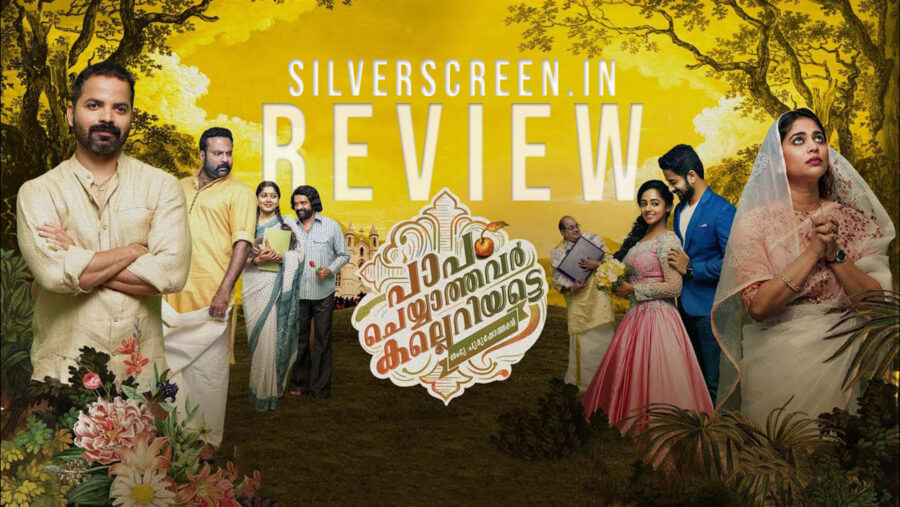Cast: Vinay Forrt, Tini Tom, Srindaa, Santhy Balachandran, Arun Kurian, Alencier Ley Lopez
Director: Shambhu Purushothaman
Music: Prashant Pillai
Shambu Purushothaman’s Paapam Cheyyathavar Kalleriyatte (Let Them Who Are Without Sin Cast The Stone) starts off with two instances of characters putting up a performance of sorts.
In the opening scene, two elite Christian families, soon to be bound by a marriage, are in an informal meeting to plan the wedding. The groom’s brother, Roy (Vinay Fort), and brother-in-law, Alex (Tini Tom) wax eloquent about the family’s reputation. When the bride’s mother offers the groom her daughter’s phone number on a piece of paper, Roy intervenes and turns it down, citing their orthodox culture. The primness on display in this meeting, you would soon realise, is a facade.
In the following scene, you see the bride and the groom (Santhy Balachandran and Arun Kurien) in a mushy romantic duet, holding hands and walking to the sunset. Another performance, this time for their ‘Save The Date’ video.
Over the course of the film, Purushothaman brings the characters down the stage, to face the hard truths they’d been ducking. Many skeletons jump out of the closets of the two families. Embarrassing secrets and financial distress that had been long swept under the carpet come out in the open. Old flames reunite. Masks fall off the faces to reveal the ugliness and hypocrisy underneath.
Purushothaman, also the film’s writer, projects this wild wedding tale as a cringe comedy that unfolds during a betrothal event. Rather than doing a character study, he hovers his camera over the sensitive situation which has the potential to burst into flames any moment.
The film proceeds through the many micro sub-plots that form on the sidelines of the main event. Roy and Alex are precariously cash-strapped. Rohan, who’s excited about the good fortune he has landed ﹣a rich girl and an insane sum of dowry ﹣realises not everything is well about his bride. His eldest sister, Lissy (Anumol), a submissive wife to an insensitive money-lender, and his mother, a dignified widow, come face to face with their pasts, adding to the brewing trouble. A stranger, an elderly womaniser equipped with a creepy smile, walks into the house and terrorises the family members with a piece of news.
The characters are an interesting motley bunch, whose reactions to situations are almost always impulsive. The film empathises with none of them but watches them from a distance and makes hilarious observations.
One of the bearers in the catering team at the event, Rajan (Anil Nedumangad), is nicknamed after the iconic romantic of the 80s’ Malayalam cinema, Venu Nagavally. The man, well past his youthful days, is still brooding over a failed romance from his college days. Rajan’s inability to move on in life becomes the butt of the film’s many jokes, just like Roy’s hypocrisy or Rohan’s mediocrity do.
Purushothaman’s film makes no fuss about moral codes. It is charmingly irreverent. Men in the film are infidels and corrupt, prone to making mistakes over and over. Women, while forced to remain within the traditional boundaries, find their own ways to protest and cross lines. Like his debut directorial Vedi Vazhipadu, Paapam Cheyyathavar Kalleriyatte too looks at human beings as inherently flawed, and it makes for some amusing complicated situations.
For one, Roy’s wife, Susan (Srindaa), unaware of the issues her husband is in, launches herself into a whirl of vengeance and self-destruction after being fed some gossip. The men of the house, caught between the old-school values ingrained in them and the new developments they encounter, react violently.
Recommended
Notwithstanding this interesting approach, the film falls short of being extraordinary. Once the level of tension has reached its pinnacle, the narrative starts to go in circles, as though it has run out of things to say. The humour starts to wane, no thanks to reiteration. The film is overtly dependent on dialogues ﹣dinner-table conversations, arguments behind closed doors, secrets whispered into ears. Use the film as a radio play, and not a lot of value will be lost. Its visual style is simplistic, made up of unreasonably lit-up interiors and walls of pop colours.
And most of all, Paapam Cheyyathavar Kalleriyalle lacks the smoothness of Vedi Vazhipaadu which smartly untied the knots in the final act. Here, the climax underestimates the complexity of the situation the characters are stuck in, and abandons the viewers. Most of the characters have arrived at a fatal point of no return.
Purushothaman, rather than finding a meaningful end to this chaos, resorts to a lazy solution, like that friend of yours whose solution to clinical depression is “Cheer up!” This, at best, reflects the commercial film industry’s unhealthy obsession with happy endings.
Also Read,
Trance Review: Fahadh Faasil Is Charged Up, But The Film Is A Half-hearted Mess
The Paapam Cheyyathavar Kalleriyalle review is a Silverscreen original article. It was not paid for or commissioned by anyone associated with the film. Silverscreen.in and its writers do not have any commercial relationship with movies that are reviewed on the site.



